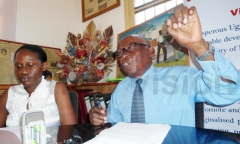Abakadde be Buganda
English translation:
A member's conversation:
As one of the members in this association, I wish to recommend all the people to join this association so that we can work together in the development of the various projects under this organization.
It does not matter whether you are very young or you are an energetic youth. Your membership is very much required. Recently we heard from the President of Uganda that he does not want to be branded an old man.
That is very unfortunate but in many countries old age starts at 50 years old. Presently in most countries these days, there are many old age citizens probably much more than the youth of working age. That is why it is becoming ever difficult for most governments in their various capacities to assist the elderly of these countries.
The elderly have been young of recent and had been working hard for themselves to look after their lives and that of their families until they have sunccumbed to the inevitable problems of old age.
In this country, old age is jokingly taken as 70 years old and the government of the day seems to have come out to say that old people are able to work for themselves as it is with so many of the government officials who are past the age of 70 years old and are busy working well for the government.
As life goes on by in a life circle, and one is a baby, and then one learns to crawl, and walk and then one becomes a youth and starts to fend for one self, gradually one has got to become old and die. Let us join this association with all the determination to help the elderly as best as we can.
By joining we are trying to make the point that we are sitting together as a team to try and solve some of the immense problems facing the elderly on the continent of Africa.
Yours faithfully,
Paul,
Of the Monkey clan in the State of Buganda and Uganda.
Govt of Uganda withdraws retirement Bill from Parliament.
By Yasiin Mugerwa
Posted Saturday, October 11 2014
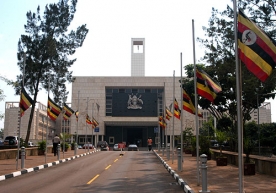 The Uganda Parliament of 50 years
The Uganda Parliament of 50 years
The Bill was first tabled in the previous Parliament and had never been withdrawn yet the government brought another draft in the current Parliament
The Parliament of Uganda.
Government on Wednesday withdrew the Retirement Benefits Sector Liberalisation Bill 2011 from Parliament and admitted “duplicating” issues in the disputed law that seeks to restructure the pension sector.
It emerged that ministry of Finance officials, either “knowingly or unknowingly” brought two Bills on pension reforms to Parliament.
The MPs said this “serious omission” misled the Parliament’s Finance Committee and the Speaker to proceed on a wrong Bill.
The Bill was read for the first time on September 19 and referred to the committee for further scrutiny.
This same Bill was first tabled in the previous Parliament and had never been withdrawn yet the government brought another draft in the current Parliament.
In the process of scrutinising the proposed pension reforms, the Finance Committee wrote to the Speaker on July 7 citing the anomalies.
The Speaker wrote back to the committee on July 27 ordering the government to withdraw the Bill.
“We apologised to the Speaker, to the Finance Committee…for duplicating the bill,” Mr Fred Omach, the junior Finance minister (General Duties) said and sought leave of Parliament to officially withdraw the Bill. The stalled pension reforms seek to end the National Social Security Fund’s monopoly and open up the sector to competition.
MPs are divided on how the proposed pension sector reforms should deal with NSSF after the government presented the planned legislation to the Finance Committee in September last year.
While many MPs admitted they had not yet “internalised” the Bill in 2010, those who had ‘perused’ opposed the proposal to give NSSF a transition of five years before the Fund joins other private players in a liberalised market.
ymugerwa@ug.nationmedia.com
Ezadde lituuse abaana 17:
Ogumu ku mirimu gye nsigazza ku nsi kuzaala kati ndi mu baana 17
Kampala, Uganda.
Mar 08, 2015
WALAKKIRA Nyanzi sipiika w’eggombolola y’e Makindye okuzaala abaana okujjuza ekika kimusuza akukunadde nga lumonde mu kikata. Ali mu bulumi olw’okulemwa okutuukiriza olubimbi lwe yeesalira okuzaala abaana 20 mu myaka ena n’asobola kufuna 17 bokka. “Ekinnuma njagala bwe mpeze emyaka 45 nga nnina abaana 100 naye kati mpezezza emyaka 37 ndi mu baana 17 bokka.
Walakira mutabani w’abagenzi Maj. Emannuel Nyanzi Walakira ne Capt. Mary Nakiganda abaabeeran¬ga e Namasuba.
Agamba nti kitaabwe yalina abaana abasoba mu 30 naye bazze bafa nga kati basigadde abaana basatu bokka era bonna balwana okulaba nga baweza ekika. Mukulu waabwe Michael Ddumba agamba nti, awezezza abaana 50 ne Ismail John Bugembe ali mu 20 naye luno lubimbi lwe okuyisa bakulu be ekika kiwere. Omwana we eyasooka yamufuna mu 2007 nga Justine Nabbanja ye yamuzaala.
Walakkira agamba nti, azadde mu bakyala ab’enjawulo wakati wa 2007 ne 2015 era bonna abamanyi.
Agamba omukyala gwe yasooka okuwasa baafuna obutakkaanya ne baawukana wabula Mukama n’amuwa omulala gw’agamba nti Katonda yamuwa kirabo kubanga ono ayagala buli mwana era olumutegeeza nti, yazadde ng’amugamba amuleete awaka amulere baweze ekika.
The old people's social protection charter: Uganda makes progress, but challenges persist
Written by Edward Ssekika
The 82-year-old is a resident of Kyesiga, a suburb of Hoima municipality, Hoima district. Though he is too old for any kind of work, he still meets his basics of life.
“I am a pensioner,” he says adding: “My pension money is enough to cater for basic needs.” Much as he could not disclose his monthly pension, Bahemirwa even uses part of it to pay tuition fees for one of his granddaughters.
“This little pension money is very important, especially when you are aged,” he narrates. Without pension, he says, he could possibly either be depending on his children or living a destitute life. In addition to a monthly pension, he also received gratuity that he used to set up a small cattle farm, where he further earns money.
Bahemirwa is one of a few Ugandans who enjoy social protection on retirement or when they can longer work. The 52-year-old Jackson Irumba, on the other hand, was sent into early retirement due to health complications. He was a primary school teacher in a privately-run school in Nyamarunda trading centre, Kibaale district.
In his energetic days, Irumba planted three acres of coffee and an acre of bananas for local brew as ‘an insurance’ of where he would get income in old age. However, both the bananas and coffee were attacked and wiped out by banana bacterial wilt and coffee wilt respectively.
To make matters worse, he never made any savings for the future yet he was not a civil servant to qualify for government pension. “I normally receive financial support from my daughter who is a teacher,” he said. With no income of his own, and would therefore live a destitute live, if the daughter wasn’t offering a hand.
Many Ugandans face similar difficulties like Irumba. Majority work in the informal sector and when they cease to work either due to advanced age or other reasons, they fall back into a poverty trap, because while they worked, they never saved for their future. Therefore, they either depend on handouts from their immediate relatives or live destitute. That is why every person needs some kind of social protection.
SOCIAL PROTECTION
Irumba calls on government to also enroll him on the senior citizens grants to be able to earn an income. However, the senior citizens grants under Social Assistance Grants for Empowerment (SAGE), is currently run only in 14 districts, where elder persons are given a monthly cash transfer of Shs 25,000. However, Kibaale is not one of them.
Even then, he may still not quality because the grants are available to persons above 60 years of age. Due to SAGE interventions, most Ugandans look at social protection in terms of ‘cash transfers’ to senior citizens grants. However, Stephen Kasaija, the head of Social Protection Secretariat in the ministry of Gender, Labour and Social Development, says social protection is much broader than cash transfers.
Social protection, Kasaija explains, is any public or private interventions that address issues of risk and vulnerabilities that occur in the life cycle of every individual. It includes protection of orphans and other vulnerable children, the disabled, youth, women, unemployed and elder persons, among others. Social protection in Uganda is enshrined in the National Objectives and Directive Principles of State Policy in the constitution.
But how is the country faring on the social protection front? Kasaija believes that Uganda is making serious inroads in as far as social protection is concerned, though there is still a lot to do. “We now have a draft policy in place that looks at social protection broadly,” he said. The draft policy outlines two key interventions to social protection; namely, social security and social care.
Social security, he says, includes contributory schemes for those employed in salaried jobs in the private sector. Such schemes include mandatory contributory schemes for retirement like National Social Security Fund (NSSF) where employers and employees save 15 per cent of one’s monthly salary to the fund for the future, and insurance, among others.
Besides contributory schemes, there are also non-contributory schemes like government pension where civil servants who qualify earn gratuity and a monthly pension and cash transfers schemes like senior citizens grants and others.
SOCIAL CARE
Beside social security, the policy also identifies social care as another strategic component of social protection. Social care involves direct interventions like providing a home and other basics to orphaned or abandoned children, the extremely disabled or extremely old and vulnerable elders.
However, government has not invested a lot in social protection, leaving the bulk of the interventions to non-government organisations (NGOs) that have built foster homes for abandoned children and others.
“At the moment, the country has only one government-run reception centre in Naguru for abandoned children and the rest are handled by NGOs without government support. But this is a responsibility of government. We need more reception centers in the country,” he says.
NARROW CATCHEMENT
A 2014 report authored by the World Bank titled Reducing Old Age and Economic Vulnerabilities: Why Uganda Should Improve Its Pension System”, reveals that Uganda’s work force is estimated to be 15 million people. However, only 2.5 million are employed in the formal wage-paying jobs.
Out of the 15 million workforce in the country, Kasaija says, only 750,000 save for their future with NSSF while only 250,000 civil servants on government payroll are potential pensioners and only 50,000 are on government pension. These statistics reveal that less than one million Ugandans in formal employment are eligible for retirement benefits.
The report calls for improved pension system even for those in the informal sector to help reduce old-age vulnerabilities, promote social transformation and accelerate economic development.
In a bid to widen the catchment area, government enacted the Uganda Retirement Benefits Regulatory Authority (URBRA) Act as an important step towards liberalization the pensions sector and making it user-friendly.
David Nyakundi, the Chief Executive Officer of URBRA, said the Authority has so far made a number of regulations under the act in execution of its mandate. The authority also licenses and supervises other employer or institution-based pension schemes, where employer helps employees save for their retirement.
“So far, we have 92 [retirement benefits schemes] schemes both private and public,” he said. He observes that all these schemes have a narrow catchment area.
“Currently the system is designed for people assumed to be earning monthly salary. It is a colonial-designed sector that left out the informal sector,” he says.
“Now that we have the huge and powerful informal sector reality, we need to design a retirement benefit scheme that incorporates them,” he argues.
REFORM GOVERNMENT PENSION
Under government pension scheme, civil servants don’t contribute to their pension and gratuity and running such a scheme is costly to the taxpayers. Dan Ngabirano, a lecturer of law at Makerere University, argues: “So, there is that whole burden on government and which the government will not sustain because as the population is increasingly becoming healthier, people live longer and as such you will have more people on pension,” he said.
Kasaija observes that in future the government pension may be too huge for government and, therefore, needs to be reformed. He wants it to be made contributory, so that civil servants just like employees in the private sector, contribute towards their pension.
“We are trying to make it also contributory. We need to harmonize the pension system and make government pension contributory like in the private sector,” he argues.
Kasaija also argues that contributions to NSSF and other retirement benefits funds should not be rigid. For instance, these schemes should allow a member to withdraw a certain percentage in case he or she becomes temporarily unemployed as he or she looks for another job or be able to use the savings as a mortgage.
Jim Yong Kim, World Bank president, in a statement issued on June 30, 2015, called for universal social protection. He said social protection is going to be a strong pillar in the new Sustainable Development Goals (SDGs) that will replace the Millennium Development Goals (MDGs). He calls on countries, Uganda inclusive, to implement social protection laws and policies to achieve substantially for the poor and vulnerable.
MINIMUM WAGE
Another tool of social protection the country is looking at is the recently-reconstituted Minimum Wages Advisory Board. Cabinet approved the board recently. The board, headed by former secretary to the treasury Chris Kassami, is expected to undertake a comprehensive study on the wage trends in different sectors of the economy by analyzing employment trends, the cost of living, and wage trends according to professions in different countries.
In a paper titled Minimum Wage in Uganda: An Urgent Call authored by Friedrich-Ebert Stiftung (FES), an international NGO, observes that a minimum wage is first and foremost a basic social protection floor to guarantee a basic survival standard in a given society.
“Many Ugandans are working, but their earnings are too meagre to lift them out of poverty. They are known as working poor, who need protection,” the report reads.
Uganda last set a minimum wage of Shs 6,000(2 dollars) per month in 1984, which is currently the minimum wage. The Minimum Wage Advisory Board in 1995 recommended it be revised to Shs 75,000 monthly for unskilled workers, but the recommended was never adopted.
ssekika@observer.ug
A warning has been put out concerning the very high cost of wages for the Members of Parliament in Uganda:
By Billy Rwothungeyo
Posted on 8th March 2016




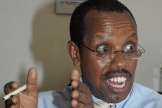
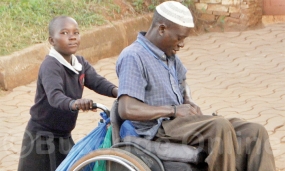
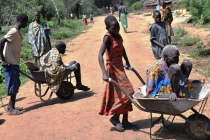

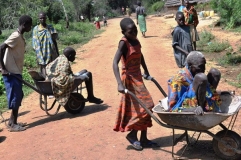

 Empuuta ezitundibwa bwe zenkana
Empuuta ezitundibwa bwe zenkana Omusuubuzi ng'asalaasala ebifi by'empuuta bakasitoma bye bagula mu katale
Omusuubuzi ng'asalaasala ebifi by'empuuta bakasitoma bye bagula mu katale Kivumbi ng'alaga empuuta n'engege bye batunda
Kivumbi ng'alaga empuuta n'engege bye batunda






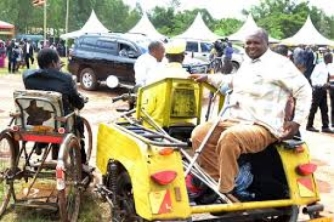

 Agatha Nabukenya naye akwatiddwa mu bubbi bw'amasannyalaze.
Agatha Nabukenya naye akwatiddwa mu bubbi bw'amasannyalaze.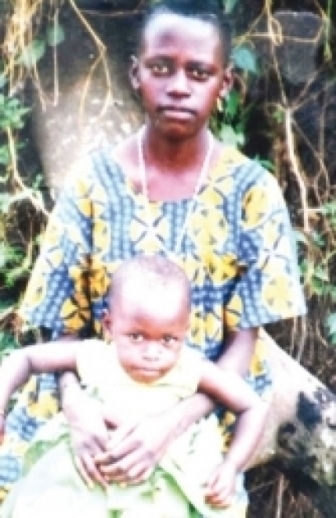



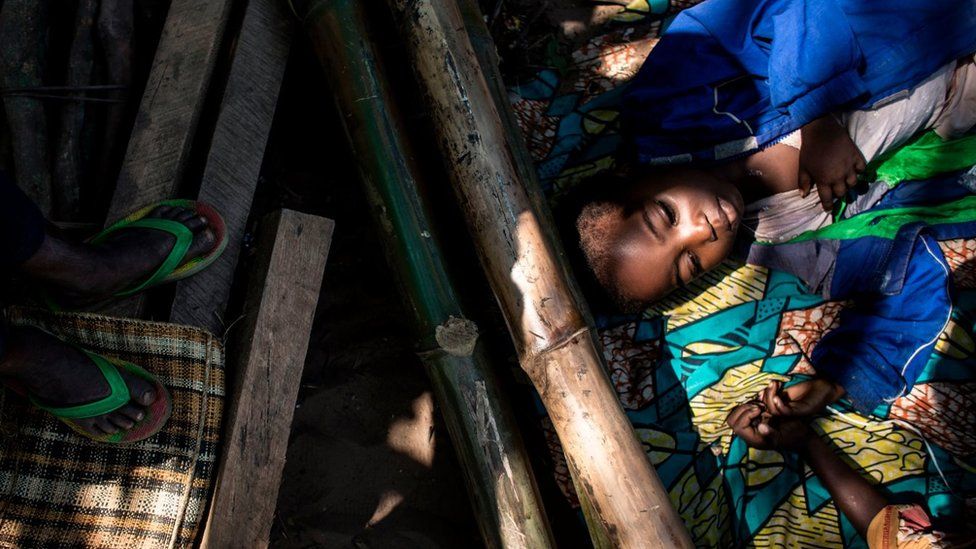
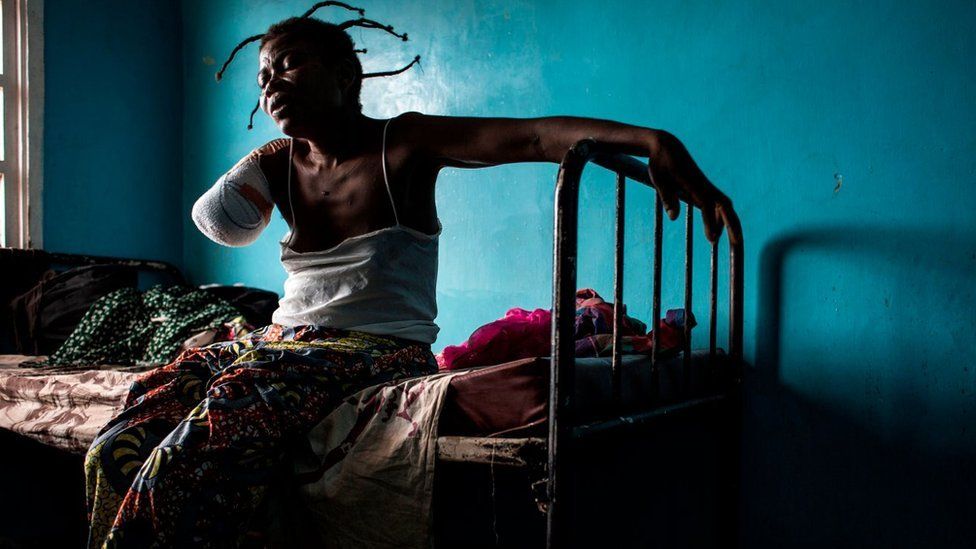 Death and life-changing injuries haunt the people left behind
Death and life-changing injuries haunt the people left behind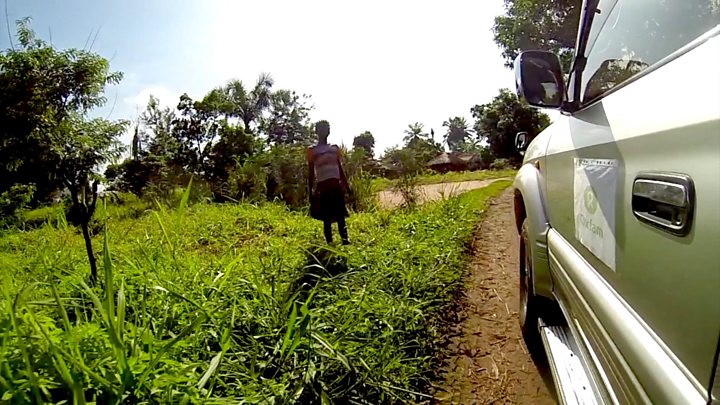 The Kasai road where everyone is hungry
The Kasai road where everyone is hungry

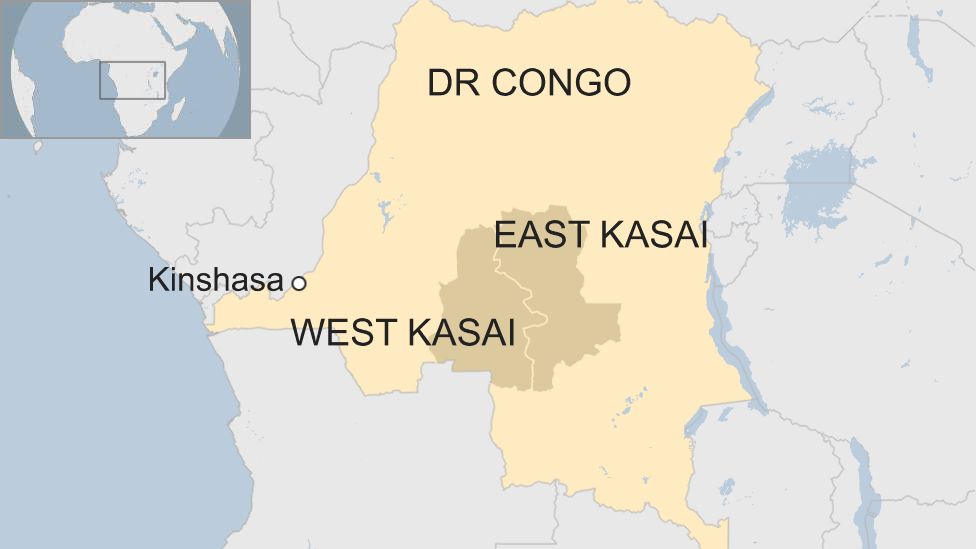



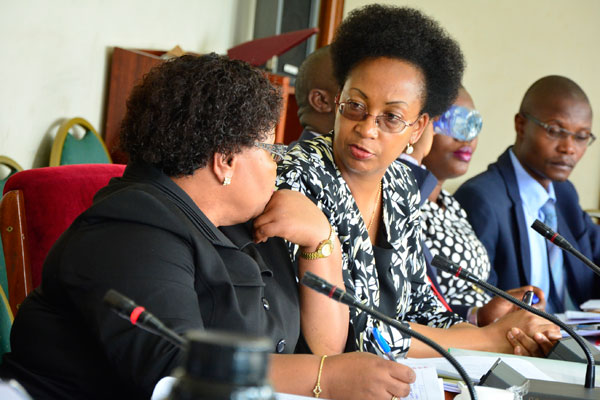
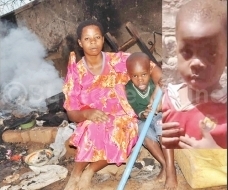
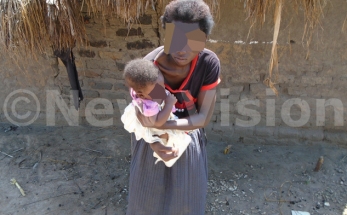

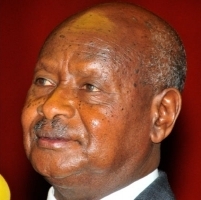
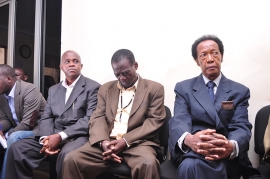
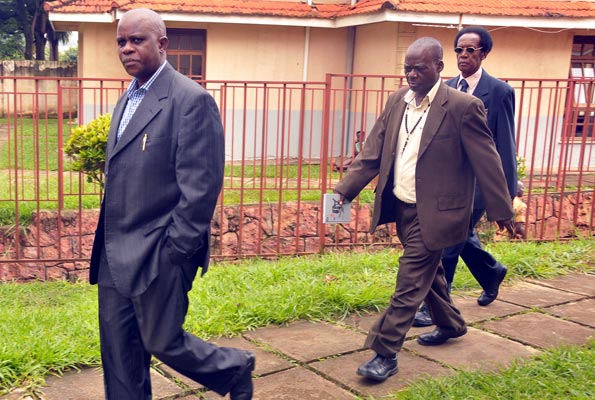
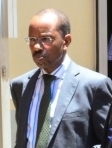 The famous Secretary to the Treasury, Mr Keith Muhakanizi
The famous Secretary to the Treasury, Mr Keith Muhakanizi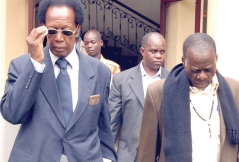
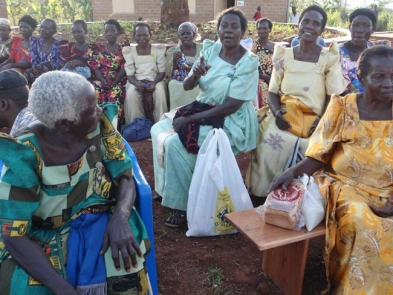


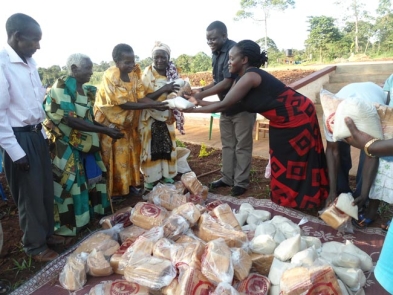
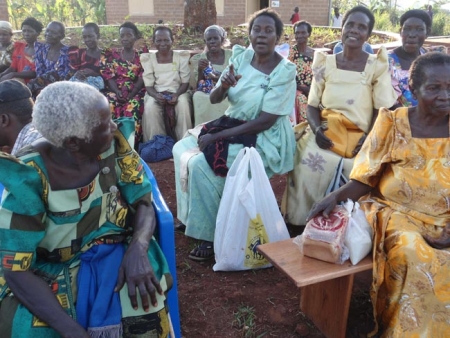
 The Uganda Parliament of 50 years
The Uganda Parliament of 50 years